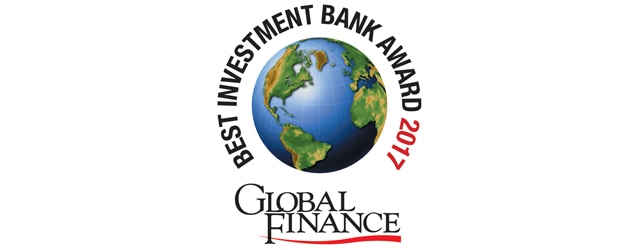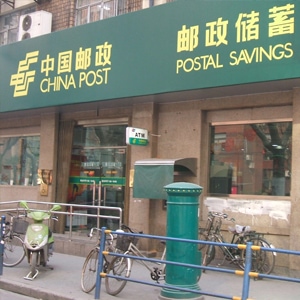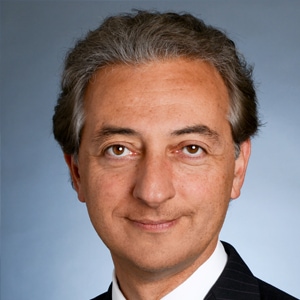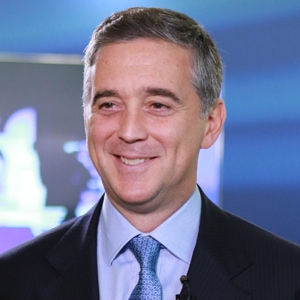After a disappointing year, investment banks are looking forward to a recovery in equity and M&A markets, and winners of our annual awards are poised to succeed.

The past year will not go down in history as a bright spot for investment banks. Driven partly by conflict in the Middle East and falling energy prices in early 2016, equity prices tumbled and investors fled to safe havens like gold and, to some extent, bonds.

As a result, investment banks had a hard time raising money for corporate clients. Take related revenue as a measure of hardship: In calendar year 2016 banks reported a 5% decline year-on-year in revenues from worldwide investment banking activities—ranging from raising money for their clients on stock and bond markets to advising them on mergers and acquisitions. All told, global investment banking revenue was only $73.6 billion, the lowest amount since 2012, deep in the global recession, when the figure fell to $69.3 billion, according to Dealogic.2016, equity prices tumbled and investors fled to safe havens like gold and, to some extent, bonds.
The few investment banks that excel in this challenging environment distinguish themselves by consistently making wise use of their access to global capital markets, sustaining strong balance sheets, leveraging their most talented bankers, exploiting low interest rates and convincing their clients to price deals realistically.
The winners of our Best Investment Banks awards were selected by Global Finance editors with input from industry experts using a wide range of criteria from market share to number and size of deals, including service and advice, structuring capabilities, distribution network, efforts to address market conditions, innovation, pricing, after-market performance of underwritings, and market reputation.
UBS stood out on these criteria and wins our overall award for Best Investment Bank worldwide. UBS displayed a superlative command over capital markets in the M&A arena despite increasingly volatile asset prices. In the United States, the 155-year-old Swiss bank was quick to spot an opportunity to advise regional US banks on mergers and acquisitions to increase their capitalization. The bank also showed a knack for orchestrating deals in cash. In one telling example, UBS served as the lead financial advisor to EverBank of Jacksonville, Florida, on its $2.5 billion sale to Teachers Insurance and Annuity Association (TIAA) in the largest all-cash M&A transaction since 2009, according to UBS.
In global equity capital markets, UBS has stood out among the bookrunners of several of the world’s most lucrative initial public offerings (IPOs) in a year

that will go down in Dealogic’s records as the worst for IPOs since 2012. The Swiss bank got in on some of the hottest deals in Asia-Pacific, the only region in the world that saw solid growth in capital markets last year. UBS was a bookrunner for the $7.4 billion IPO of Postal Savings Bank of China last September in the world’s biggest IPO since Alibaba raised $25 billion in 2014. All told, UBS raised a formidable $24.3 billion in 194 equity deals for its clients last year, according to Dealogic.“The M&A market is white-hot at the moment,” says Piero Novelli, UBS global head of advisory. “We are putting extra focus on our most important clients and ensuring we give the greatest support to our most effective bankers.”
Novelli emphasizes that UBS has paid attention to developing its teams, particularly their ability to collaborate globally. “We are deploying our top bankers and best advisors on the most important clients and most promising deal situations to ensure we are extremely focused,” he says.
Renewed interest in M&A paved the way last year for a renaissance in equity-linked debt, one of few bright spots in the world’s capital markets. It helped that interest rates were low, making it cheaper for companies to issue convertible bonds, while high share prices made convertible bonds more attractive by mitigating investor concerns that their equity at maturity would be diluted by the issuance of new shares.
Multinationals like BP responded by issuing convertible bonds just to “show they are being agile” enough to “tap another pocket of investors,” says Thomas Feuerstein, managing director of equity-linked origination at Societe Generale Corporate & Investment Banking, which underwrote a £400 million ($429 million) convertible bond for BP last year. SG wins our Best for Equity-Linked Debt award.
“Back in 2010, the market was driven by small-cap issuance,” explains Feuerstein. “Now we see very large issues, like BP, more frequently.”
Last year was especially challenging for companies that tried to list their shares on the stock market for the first time. Morgan Stanley won our award for Best in IPOs by using its superlative access to new issuers and investors around the world to carve out the largest slice of a shrinking pie, raising $262 million for its clients in 21 initial public offerings in the US and 14 others in Europe, the Middle East and Africa. Bear in mind that the revenue that all investment banks earned from IPOs worldwide fell to just $4.1 billion in 2016, the lowest level since 2012, when they earned only $3.9 billion.
This year will present a whole new set of challenges for our winners. On March 2, just 15 days after Morgan Stanley raked in $26 million in fees as lead underwriter of the IPO for Snap, the parent company of social media phenomenon Snapchat, the shares were trading 19.5% below the IPO price of $24.28. That experience may impact interest in the IPOs of financial technology company Palantir, online car service Uber, and other technology companies.
REGIONAL WINNERS
At the regional level, our award for Best Investment Bank in North America goes to Goldman Sachs, which secured a strong lead in the region’s M&A league tables by advising its clients on no less than 202 mergers and acquisitions that were valued at $745.1 billion, according to Dealogic. This strong lead secured a 33.5% share of the region’s M&A market for Goldman. The Wall Street titan also ranked a close second to J.P. Morgan in North America’s equity capital markets, raising $28.9 billion in 188 deals and claiming an 11.8% market share.

In Western Europe, the shock waves that the Brexit vote sent across the Continent wreaked havoc on investment bank activity. More challenged there than anywhere else on earth last year, Europe’s investment banks reported less revenue from investment banking than at any time in the previous 13 years, pulling in a mere $16 billion. The UK accounted for a smaller share of investment banking in Europe overall than in the previous year, falling to just 25%, according to Dealogic.
Historically among the most stable and best capital banks in the eurozone, Deutsche Bank, which won our award for Best Investment Bank in Western Europe, served as the lead bookrunner for the IPO of innogy SE, the green energy business of German electrical utility RWE. Raising $5.2 billion on the Prime Standard of the Frankfurt Stock Exchange, innogy was the third largest IPO of 2016 — and Europe’s biggest since Glencore Plc went public in 2011. This year, Deutsche Bank expects revenues from investment banking to receive a boost from an improved economic outlook, according to a statement by the bank.
Central and Eastern Europe (CEE) benefited from oil prices first rising and then stabilizing last year. Despite US sanctions against Russia in retaliation for allegedly meddling in the US presidential election last November, and international sanctions tied to Russia’s invasion of Ukraine in 2014, higher oil prices, combined with signs that economic growth was returning and inflation had decelerated, helped to propel a 17% surge in the MICEX index of Russian stocks during the last two months of 2016.
“Even after these rises, CEE equities still look undervalued relative to developed markets; and together, these factors are reigniting investor interest in the

region,” says Riccardo Orcel, deputy CEO of VTB Group, the parent company of VTB Capital of Moscow, which wins our award for Best Investment Bank in Central and Eastern Europe. “We have also noticed that international banks are more interested in returning to the Russian market.”
In the bond market in particular, Orcel sees strong demand for high-quality issuers from the CEE. Bond prices are tightening up but still providing investors with attractive yields compared to those of bonds being issued this year in developed markets. Orcel cites a $500 million eurobond issued by Russian Railways at a yield of just 4.375%, showing strong demand, in a deal that VTB Capital led. “We have a strong pipeline of capital markets deals in the near term,” says Orcel. “The increased availability of attractive rates in the international capital markets is likely to mean that public issuance increases further this year.”
In Asia-Pacific, the only region to see solid growth in capital markets last year, banks reported a total of $16 billion investment banking revenue for 2016—breaking the previous record of $15.8 billion, set in 2010. This growth was driven by heightened capital markets activity in China, where investment banking revenue surged to an all-time high of $8.8 billion. At the top of the heap was CITIC Securities of China, which snags our award for Best Investment Bank in Asia-Pacific. All told, CITIC raked in $523 million in revenue from its investment banking services in China—more than any other bank in the world’s most populous nation—last year.

Our award for Best Investment Bank in Latin America goes to Itaú BBA. Building on its legacy strength in mergers and acquisitions in its native Brazil, Itaú has shattered the myth that banks based in Spanish-speaking countries enjoy a natural advantage in South American countries other than Brazil, where the national language is Portuguese. Itaú successfully spread its wings across the region’s Spanish-speaking countries. In 2016, Itaú BBA dominated mergers and acquisitions in Latin America, commanding a higher market share than any other bank. The bank led some of the highest-profile deals south of the US-Mexican border, serving as financial advisor to Statoil on its $2.5 billion acquisition of Petrobras’s stake in its Carcará field. Another strong suit for Itaú BBA is equity; it raised $664 million for its clients in seven deals for a 6.4% share of the region’s equity capital market, according to Dealogic.
UPSTARTS AND START-UPS
In other emerging and frontier markets, investors were most likely to avoid the Middle East and Africa last year. Our award for Best Investment Bank in the Middle East goes to Samba Capital of Saudi Arabia, which distinguished itself on the stock market despite military conflict in the region by raising $471 million in a single equity deal that garnered a 13.9% share of the capital raised on the region’s troubled stock market last year—more than any other bank on record.

Our award for Best Investment Bank in Africa goes to Standard Bank of South Africa which, with branches and licensed banks scattered strategically across the continent, advised its clients on seven M&A deals that were valued at $7.9 billion last year. All told, Standard commanded an 11.9% equity market share in Africa—more than any other bank. Based in Johannesburg, South Africa, this 154-year-old bank controls its own balance sheets in 20 countries across Africa through its local entities, such as Stanbic Holdings in Kenya and Stanbic IBTC Bank in Nigeria. Off the continent, the bank has a strong partnership with Industrial and Commercial Bank of China, which in in turn owns 20% of the bank in South Africa and 60% of its subsidiary in the UK, That bank has actually been renamed ICBC Standard Bank. The bank now has in-country advisory capabilities in China and the UK.
“We make sure we have a real brick-and-mortar presence on the ground, with balance sheets and the capacity to do corporate market transactions, in every single one of the markets that we are in,” says Bill Blackie, head of investment banking at Standard Bank in Johannesburg. These advantages helped Standard also pick up our award for Best in Emerging Markets. “Most of my clients are coming to the market for the first time,” he adds.
This year, investment bankers are eyeing emerging markets, where their next new corporate clients will emerge. “The most important thing to watch is the recovery of economies post-economic slump,” explains Blackie. “Those that have been most disciplined will recover quicker. That will be a good indicator of where it will be most attractive to invest going forward.”
It’s only fitting that we found our Best Up & Comer in China, where investment banks saw their revenue surge to an all-time high of $8.8 billion last year.

Guotai Junan Securities Co. of Shanghai advised Shanghai Electric Power on its acquisition of a 66.4% stake in K-Electric of Pakistan in a $1.8 billion deal last October. According to Dealogic, that deal represented a 5.6% share of the entire market for M&A in frontier markets last year.
Now it’s incumbent on Shanghai Electric, Guotai’s client, to secure the approval of local regulators, which will mean resolving a dispute that cropped up in February over $1.2 billion in fees that K-Electric allegedly owes two Pakistan government agencies.
However, it’s a Wall Street titan we honor for its unbeatable will to close one merger after another in some of the world’s most remote and least predictable countries. Best in Frontier Markets goes to Citi (which also won Best for Securitization). Citi advised Pampa Energia on its $1.1 billion acquisition of a 67.2% stake in Petrobras Argentina last May and Central Group of Companies on its $1.1 billion acquisition of hypermarket chain Big C Vietnam last April. All told, Citi advised clients on 11 M&A transactions that were valued at $6.4 billion—more than any other bank in frontier markets—last year.
|
World’s Best Investment Banks 2017 |
|
|
Global Winners |
|
|
Global Best Investment Bank – UBS |
|
|
Best in Emerging Markets |
Standard Bank |
|
Best in Frontier Markets |
Citi |
|
Best Up & Comer |
Guotai Junan Securities Co. |
|
Best Bank for IPOs |
Morgan Stanley |
|
Best Bank for Securitization |
Citi |
|
Best Bank for Equity-Linked Debt |
Societe Generale |
|
Regional Winners |
|
|
North America |
Goldman Sachs |
|
Western Europe |
Deutsche Bank |
|
Central & Eastern Europe |
VTB Capital |
|
Asia-Pacific |
CITIC Securities |
|
Latin America |
Itau BBA |
|
Middle East |
Samba Capital |
|
Africa |
Standard Bank |
|
World’s Best Investment Banks 2017 |
|
COUNTRY Winners |
|
Angola |
Standard Bank Angola |
|
Argentina |
Quantum Finanzas |
|
Armenia |
Ameriagroup |
|
Australia |
Macquarie Group |
|
Austria |
Raffeisen Bank International |
|
Bahrain |
Securities & Investment Co. |
|
Belgium |
Barclays |
|
Brazil |
Bradesco BBI |
|
Canada |
Royal Bank of Canada |
|
Chile |
Larrainvial |
|
China |
China International Capital |
|
Colombia |
Bancolombia |
|
Denmark |
Nordea Denmark |
|
Egypt |
EFG-Hermes Investment Banking |
|
Finland |
Nordea Finland |
|
France |
BNP Paribas |
|
Georgia |
Galt & Taggart |
|
Germany |
Deutsche Bank |
|
Ghana |
Stanbic Ghana |
|
Greece |
Societe Generale |
|
Hong Kong |
Kingston Financial Group |
|
Iceland |
Arion Banki |
|
India |
Arpwood Capital |
|
Indonesia |
Mandiri Sekuritas |
|
Iraq |
Exotix |
|
Ireland |
Fexco Holdings |
|
Israel |
Excellence Nessuah Underwriting |
|
Italy |
UniCredit |
|
Japan |
Mizuho |
|
Jordan |
Jordan Commercial Bank |
|
Kazakhstan |
UBS |
|
Kenya |
Stanbic Bank Kenya |
|
Kuwait |
Markaz |
|
Lebanon |
J.P. Morgan |
|
Malaysia |
Maybank |
|
Mauritius |
Java Capital |
|
Mexico |
BBVA |
|
Mongolia |
TDB Capital |
|
Morocco |
Attijariwafa Bank |
|
Mozambique |
BCI |
|
Netherlands |
Goldman Sachs |
|
New Zealand |
Grant Samuel & Associates |
|
Nigeria |
FBNQuest |
|
Norway |
Nordea |
|
Oman |
Bank Muscat |
|
Pakistan |
Habib Bank Limited |
|
Peru |
Santander |
|
Philippines |
BDO Capital |
|
Poland |
Bank Pekao |
|
Portugal |
CaixaBI |
|
Puerto Rico |
Sandler O’Neill & Partners |
|
Qatar |
Masraf Al Rayan |
|
Russia |
VTB Capital |
|
Saudi Arabia |
Samba Capital |
|
Singapore |
DBS |
|
South Africa |
FirstRand Bank |
|
South Korea |
NH Investment & Securities Co. |
|
Spain |
BBVA |
|
Sweden |
Carnegie |
|
Switzerland |
UBS |
|
Taiwan |
Fubon Financial Holding Co. |
|
Thailand |
Siam Commercial Bank |
|
Turkey |
Garanti Bank |
|
UAE |
Emirates NBD |
|
Ukraine |
Unicredit |
|
United Kingdom |
HSBC |
|
United States |
J.P. Morgan |
|
Vietnam |
Techcom Securities |



